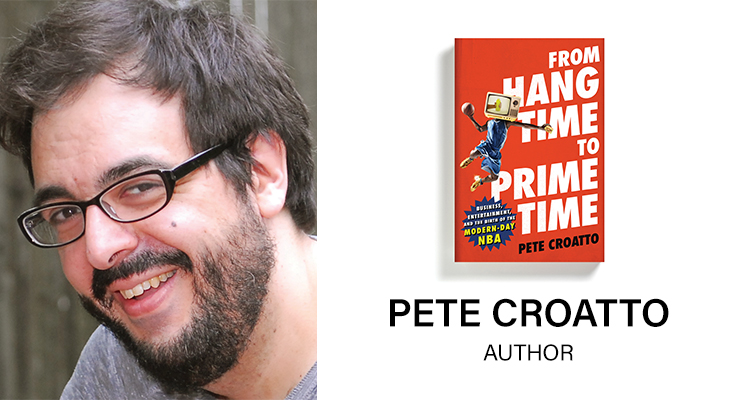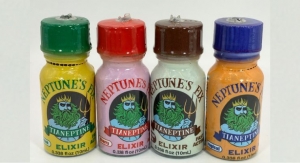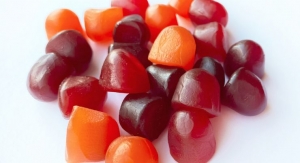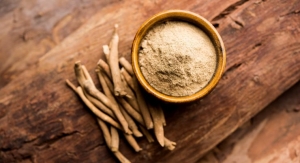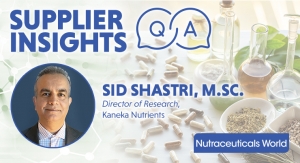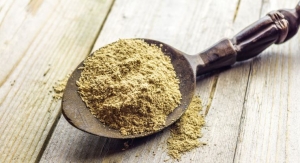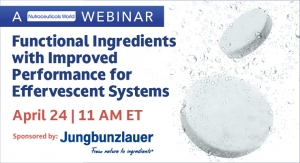By Sheldon Baker03.03.21
Before Pete Croatto became a freelance writer and editor in 2006 focusing on sports and pop culture, he was a trade magazine writer focusing on various facets of the natural products industry. He was the associate editor at VRM, Inc., the publisher of Nutrition Industry Executive, from March 2003 to November 2006. Though Croatto has written about the industry since he left—he managed Informa's Supplement Perspectives from 2011 to 2015—his essays, interviews, and reporting have appeared in many outlets, including The New York Times, GQ.com, The Christian Science Monitor, Barron's, RollingStone.com, and Shondaland. His first book, From Hang Time to Prime Time: Business, Entertainment, and the Birth of the Modern-day NBA (Atria Books), was released in December 2020. It covers the NBA's rise from an afterthought in an American sports culture to an international business and cultural behemoth and is available at all major booksellers.
Health E-Insights: How did the book idea come about?
Croatto: Way back in 2013, I wrote a piece for Grantland, the now dormant ESPN sports and pop-culture website, about Marvin Gaye's rendition of the national anthem at the 1983 NBA All-Star Game. Two things stood out after the piece came out. First, I could not put everything I wanted to in a 3,000-word story. Second, the performance of that anthem—which was the epitome of non-traditional—marked the line between the old, stodgy NBA and the new, entertainment-infused NBA. It seemed like a perfect premise for a book. So, what, eight years later, here we are.
Health E-Insights: You interviewed a lot of people for this book.
Croatto: By my count, I conducted 315 original interviews for the book. I slept OK, and part of it is because of my experience as an assistant, and later associate, editor at VRM, Inc. from 2003 to 2006. Me and two other editors—Paul Bubny and Brenda Porter-Rockwell—were responsible for editing, reporting, and writing content for three magazines, or 28 issues a year. Sure, we had some freelance contributions, but we were all responsible for assembling two to three 2,000-word stories a month—interviews, writing, editing, you name it. Writing a book was, in some ways easier, believe it or not. And I got to avoid wearing business casual attire.
Health E-Insights: What was one major marketing approach that helped spearhead the NBA to the success it is today?
Croatto: The NBA focused on the players. Yes, the teams during that era were great—fans of the Lakers and Celtics will attest to that—but the late NBA commissioner David Stern, his employees, and his partners (namely CBS Sports) marketed the stars. And that was ingenious, because A) it attracted people who may not be enamored with basketball as a whole but might want to see Julius Erving dunk or Magic Johnson whip a no-look pass—it was OK to watch a game just for that; and B) it was a way for people unfamiliar with the game—who did not have a team passed down by their parents or siblings—to get into the NBA. I am a prime example of that. My parents got me into reading, but they are not sports fans. I got into the NBA because of Michael Jordan (for obvious reasons), Patrick Ewing (he was the best player on my local team, the New York Knicks), and Kevin McHale (a goofy, gangly-looking scoring machine who resonated with 14-year-old me).
Health E-Insights: If there was no Michael Jordan, does the NBA experience as much success?
Croatto: Absolutely not. Michael Jordan was the NBA's first box-office star, a soloist who was a champion. An attractive, charismatic athlete who understood exactly what his value was in the public eye, both as a sports hero and as pitchman. He was somebody new fans could latch on to, the perfect gateway drug for full NBA immersion.
Health E-Insights: What things made you go ‘that is unbelievable,’ or ‘that is amazing.’
Croatto: Probably, the number of people involved in the NBA's success. Whenever we talk about the NBA's rise in the 1980s, people cite the obvious, and correct, people: Magic Johnson, Larry Bird, David Stern, and Michael Jordan. But there were dozens of people, who helped turn the NBA into the behemoth it is today. People like Ted Shaker at CBS Sports, who revitalized the network's coverage of NBA games, Bill Marshall, who turned NBA apparel into a goldmine and pretty much everyone at NBA Entertainment. I wanted my book to give those people their due.
Health E-Insights: If you could trade places with an NBA executive who would it be?
Croatto: Oh, man. Probably Leah Wilcox, the longtime consigliere of NBA Entertainment, the league's highlights, and video arm. She knows everybody and has such respect in and outside the league. I would love to see what she does in a day as a behind-the-scenes giant.
Health E-Insights: Nutraceuticals World is a natural health publication. What is your feeling about players use of cannabis?
Croatto: I am all for it. I think the benefits of cannabis far outweigh any concerns, which are most likely the result of Reefer Madness-inspired misinformation. Also, NBA teams are worth billions of dollars, and employ an army of specialists and experts to make sure the players' performance is top-notch. Heck, the players do that on their own. Someone told me that LeBron James spends $1 million a year for that very purpose. With that said, I believe there is too much at stake. Personally, and professionally for any NBA player to morph into a cautionary tale or the lead character in an Afterschool Special. The players are adults and should be treated as such.
Health E-Insights: COVID aside, where do you envision the growth of the NBA in the next few years?
Croatto: That is hard to say, because the NBA is massive right now. I mean, it is practically Google or Microsoft. I will say that I would like to see the NBA put more effort into promoting the WNBA and perhaps have its season run with the NBA season. Will that happen? Probably not.
Health E-Insights: We recently lost an NBA great in K.C. Jones.
Croatto: What a remarkable career. Gold medalist. Multiple NBA championships as a player and as a head coach. It shows just how quickly time moves. Here is a legendary figure who was practically forgotten, but whose accomplishments were revived by his death. It is a sign of the NBA's popularity that news of Jones's death came and went and of the league's depth of talent that I forgot K.C. Jones's presence in the game. The same thing happened with Paul Westphal a few weeks later. And it will keep happening. The NBA honors its past, but it has eyes on the future. For a business, there is little profit in visiting the past for too long.
Health E-Insights: How much use does your driveway basketball hoop get?
Croatto: We live just outside of Ithaca, NY. It is the end of January. It was nine degrees this morning. So not much. In the summer, I will be out there perfecting my tippy-toe jumper and my hook shot. I just got a new ball and a new net. I will be ready.
Health E-Insights: You are making a special offer to basketball fans.
Croatto: I am happy to sign and mail a bookplate for anyone who buys the book. If you want an autographed copy, visit www.odysseybookstore.com.
Sheldon Baker is a senior member of Baker Dillon Group LLC and has created numerous nutraceutical brand marketing communications and public relations campaigns for many well-known supplement and food industry companies. For Health E-Insights interview consideration or brand marketing consulting, contact him at SBaker@BakerDillon.com.
Health E-Insights: How did the book idea come about?
Croatto: Way back in 2013, I wrote a piece for Grantland, the now dormant ESPN sports and pop-culture website, about Marvin Gaye's rendition of the national anthem at the 1983 NBA All-Star Game. Two things stood out after the piece came out. First, I could not put everything I wanted to in a 3,000-word story. Second, the performance of that anthem—which was the epitome of non-traditional—marked the line between the old, stodgy NBA and the new, entertainment-infused NBA. It seemed like a perfect premise for a book. So, what, eight years later, here we are.
Health E-Insights: You interviewed a lot of people for this book.
Croatto: By my count, I conducted 315 original interviews for the book. I slept OK, and part of it is because of my experience as an assistant, and later associate, editor at VRM, Inc. from 2003 to 2006. Me and two other editors—Paul Bubny and Brenda Porter-Rockwell—were responsible for editing, reporting, and writing content for three magazines, or 28 issues a year. Sure, we had some freelance contributions, but we were all responsible for assembling two to three 2,000-word stories a month—interviews, writing, editing, you name it. Writing a book was, in some ways easier, believe it or not. And I got to avoid wearing business casual attire.
Health E-Insights: What was one major marketing approach that helped spearhead the NBA to the success it is today?
Croatto: The NBA focused on the players. Yes, the teams during that era were great—fans of the Lakers and Celtics will attest to that—but the late NBA commissioner David Stern, his employees, and his partners (namely CBS Sports) marketed the stars. And that was ingenious, because A) it attracted people who may not be enamored with basketball as a whole but might want to see Julius Erving dunk or Magic Johnson whip a no-look pass—it was OK to watch a game just for that; and B) it was a way for people unfamiliar with the game—who did not have a team passed down by their parents or siblings—to get into the NBA. I am a prime example of that. My parents got me into reading, but they are not sports fans. I got into the NBA because of Michael Jordan (for obvious reasons), Patrick Ewing (he was the best player on my local team, the New York Knicks), and Kevin McHale (a goofy, gangly-looking scoring machine who resonated with 14-year-old me).
Health E-Insights: If there was no Michael Jordan, does the NBA experience as much success?
Croatto: Absolutely not. Michael Jordan was the NBA's first box-office star, a soloist who was a champion. An attractive, charismatic athlete who understood exactly what his value was in the public eye, both as a sports hero and as pitchman. He was somebody new fans could latch on to, the perfect gateway drug for full NBA immersion.
Health E-Insights: What things made you go ‘that is unbelievable,’ or ‘that is amazing.’
Croatto: Probably, the number of people involved in the NBA's success. Whenever we talk about the NBA's rise in the 1980s, people cite the obvious, and correct, people: Magic Johnson, Larry Bird, David Stern, and Michael Jordan. But there were dozens of people, who helped turn the NBA into the behemoth it is today. People like Ted Shaker at CBS Sports, who revitalized the network's coverage of NBA games, Bill Marshall, who turned NBA apparel into a goldmine and pretty much everyone at NBA Entertainment. I wanted my book to give those people their due.
Health E-Insights: If you could trade places with an NBA executive who would it be?
Croatto: Oh, man. Probably Leah Wilcox, the longtime consigliere of NBA Entertainment, the league's highlights, and video arm. She knows everybody and has such respect in and outside the league. I would love to see what she does in a day as a behind-the-scenes giant.
Health E-Insights: Nutraceuticals World is a natural health publication. What is your feeling about players use of cannabis?
Croatto: I am all for it. I think the benefits of cannabis far outweigh any concerns, which are most likely the result of Reefer Madness-inspired misinformation. Also, NBA teams are worth billions of dollars, and employ an army of specialists and experts to make sure the players' performance is top-notch. Heck, the players do that on their own. Someone told me that LeBron James spends $1 million a year for that very purpose. With that said, I believe there is too much at stake. Personally, and professionally for any NBA player to morph into a cautionary tale or the lead character in an Afterschool Special. The players are adults and should be treated as such.
Health E-Insights: COVID aside, where do you envision the growth of the NBA in the next few years?
Croatto: That is hard to say, because the NBA is massive right now. I mean, it is practically Google or Microsoft. I will say that I would like to see the NBA put more effort into promoting the WNBA and perhaps have its season run with the NBA season. Will that happen? Probably not.
Health E-Insights: We recently lost an NBA great in K.C. Jones.
Croatto: What a remarkable career. Gold medalist. Multiple NBA championships as a player and as a head coach. It shows just how quickly time moves. Here is a legendary figure who was practically forgotten, but whose accomplishments were revived by his death. It is a sign of the NBA's popularity that news of Jones's death came and went and of the league's depth of talent that I forgot K.C. Jones's presence in the game. The same thing happened with Paul Westphal a few weeks later. And it will keep happening. The NBA honors its past, but it has eyes on the future. For a business, there is little profit in visiting the past for too long.
Health E-Insights: How much use does your driveway basketball hoop get?
Croatto: We live just outside of Ithaca, NY. It is the end of January. It was nine degrees this morning. So not much. In the summer, I will be out there perfecting my tippy-toe jumper and my hook shot. I just got a new ball and a new net. I will be ready.
Health E-Insights: You are making a special offer to basketball fans.
Croatto: I am happy to sign and mail a bookplate for anyone who buys the book. If you want an autographed copy, visit www.odysseybookstore.com.
Sheldon Baker is a senior member of Baker Dillon Group LLC and has created numerous nutraceutical brand marketing communications and public relations campaigns for many well-known supplement and food industry companies. For Health E-Insights interview consideration or brand marketing consulting, contact him at SBaker@BakerDillon.com.

